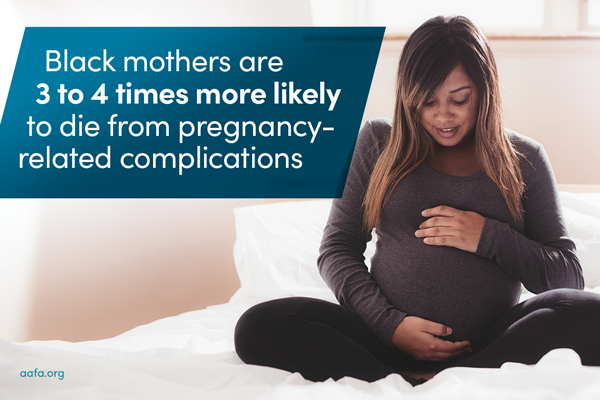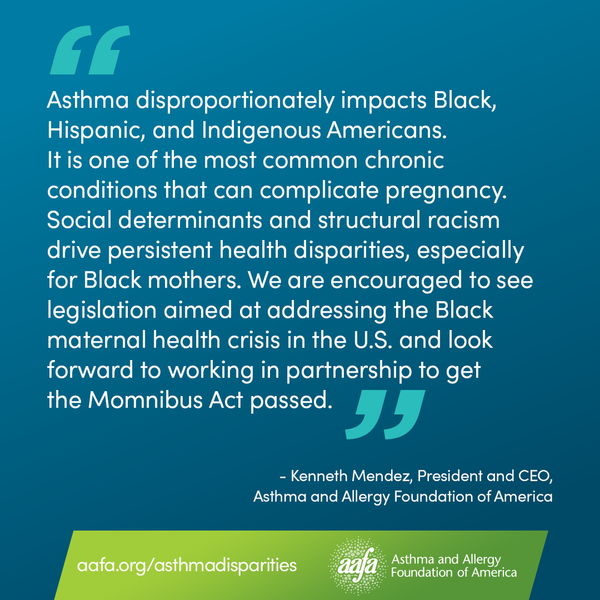Advocacy Action Alert! Ask your representatives to support the Black Maternal Health Momnibus Act. Use our simple tool at the bottom of this blog post to email a letter or share your message on Twitter.
On Feb. 8, 2021, Rep. Lauren Underwood (D-IL), Rep. Alma Adams (D-NC), Senator Cory Booker (D-NJ), and other leaders of Congress introduced the Black Maternal Health Momnibus Act. The act is made up of 12 bills introduced by Black Maternal Health Caucus members. Its goal is to address the health crisis among Black mothers in the U.S.
America has the highest numbers of deaths among pregnant and new mothers in the developed world. And the rate is rising. This crisis is most severe for Black mothers. Black mothers are three to four times more likely to die from complications that arise in pregnancy.

Asthma is one of the most common conditions that can affect pregnancy. Black women also have the highest death rates from asthma in the United States. In the Asthma and Allergy Foundation of America’s (AAFA) “Asthma Disparities in America” report, we look at how social determinants (factors) of health and structural racism drive disparities in asthma.
AAFA is proud to support the Black Maternal Health Momnibus Act with the goal of ending maternal deaths and closing racial and ethnic disparities in maternal health outcomes.

AAFA is especially encouraged by two bills within the Momnibus Act:
- The Social Determinants for Moms Act makes key investments in social determinants to end disparities in maternal health outcomes. This can include factors such as housing and environment. These investments address the same factors driving the disparities in asthma that contribute to the Black maternal health crisis.
- The Protecting Moms and Babies Against Climate Change Act invests in community programs to address climate change-related risks. Climate change-related risks include extreme heat, air pollution, and other threats to the environment. A recent study found that these risks are greatly related to birth outcomes. People with asthma and minority groups are at the highest risk.1 Addressing climate change is critical to improving maternal health outcomes, especially for Black mothers with asthma.
 I join @AAFANational in supporting the Black Maternal Health Momnibus Act to save the lives of Black moms and close racial and ethnic disparities in maternal health outcomes: https://ctt.ec/1Yocd+ #Asthma #HealthEquityNOW #Momnibus #SaveMoms
I join @AAFANational in supporting the Black Maternal Health Momnibus Act to save the lives of Black moms and close racial and ethnic disparities in maternal health outcomes: https://ctt.ec/1Yocd+ #Asthma #HealthEquityNOW #Momnibus #SaveMoms
Additional highlights from the Act include:
- Investments in improving social determinants of health like housing, transportation and nutrition which can impact maternal health outcomes.
- Funding for community-based organizations working to improve maternal health outcomes and promote equity.
- Improvement of data collection to better understand the causes of the maternal health crisis in the U.S. and form more solutions to address it.
- Promotion of high-quality maternity care and continuous health insurance coverage from pregnancy through labor and delivery and up to 1 year after birth.
- Strengthening programs to improve maternal health during COVID-19 and other public health emergencies.
- Promoting maternal vaccinations to protect the health and safety of moms and babies.
- Providing more support for moms in the workforce around the time of giving birth.
- It also focuses on high-risk populations including pregnant veterans, incarcerated moms, Hispanic, Indigenous, and Asian American or Pacific Islander (AAPI) Americans.
AAFA thanks the Black Maternal Health Caucus for their leadership of this critical bill. And we look forward to working with the many supporting organizations of the Momnibus Act.
Ask your legislators to support the Black Maternal Health Momnibus Act. Use our tool below to send an email to your representative. You can also choose to post your message on Twitter. Just follow the steps:
Reference
1. Bekkar B, Pacheco S, Basu R, DeNicola N. Association of Air Pollution and Heat Exposure With Preterm Birth, Low Birth Weight, and Stillbirth in the US: A Systematic Review. JAMA Netw Open. 2020;3(6):e208243. doi:10.1001/jamanetworkopen.2020.8243



Comments (1)